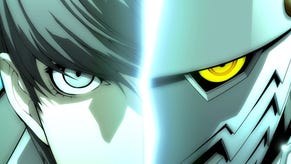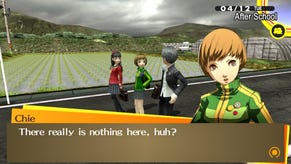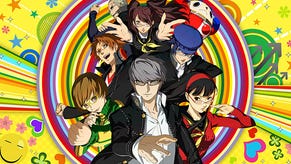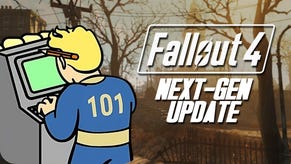The 15 Best Games Since 2000, Number 5: Persona 4
Atlus' absurdly late PlayStation 2 RPG sparked a phenomenon that still persists to this day.
This article first appeared on USgamer, a partner publication of VG247. Some content, such as this article, has been migrated to VG247 for posterity after USgamer's closure - but it has not been edited or further vetted by the VG247 team.
We're currently in the middle of our daily countdown of the 15 Best Games Since 2000. Want to read more? Check out the rest of the entries here.
Bob Mackey, Senior Writer
The handful of games released years after a console's demise normally aren't known for their quality. Typically, this window of time features the worst of the worst: Games so bad that they're barely worth acknowledging. (Oh yeah, and lots of sports.) This might be a reliable niche if you're a publisher looking to make a quick buck off a system destined to end up a hand-me-down to a younger sibling or Gamestop, but for those keen on grabbing attention over a non-budget release, pulling the press away from those new, shiny consoles can be an impossible struggle.
It's a testament to Persona 4's greatness, then, that it managed to find an audience much bigger than the standard Atlus RPG crowd. Granted, at the time we believed our seventh generation of consoles would likely have the same shelf life as the previous set, so the idea of a major PlayStation 2 game releasing in the final days of 2008—two years after the PS3, and three after the Xbox 360—felt just the teensiest bit preposterous. But players with enough courage to brave the dust bunnies and cobwebs surrounding their abandoned PS2s not only discovered a fantastic RPG with Persona 4, but what many have called the best of an entire generation.
"It's a testament to Persona 4's greatness that it managed to find an audience much bigger than the standard Atlus RPG crowd."
Of course, Persona 4 didn't just spring into existence. This sequel largely draws most of its inspiration from 2006's Persona 3, which divorced itself from the rich, but slightly unintuitive mechanics of past games in the series. Even so, Persona 3 and 4 are still Shin Megami Tensei to the bone, and their more streamlined forms work in tandem with the surrounding pop art aesthetic for an RPG experience that feels slick and snappy—even if you'll likely spend more than 100 hours with each game.
And the secret to Persona's success can be found in how its ongoing story breaks itself up into manageable, in-game days. Seeing those months stretch out in front of you (and with no defined end) when starting Persona may seem daunting at first, but each day offers a wealth of different activities that make the time fly by: diving into dungeons, working part-time jobs, shopping, hanging with friends and developing those all-important social traits, and fusing monsters in your party to develop some new and terrifying abomination. Persona has the same "just one more day" effect found in other life sims like Harvest Moon and The Sims, but with a meaty core that reaches straight into the hearts of RPG fanatics.
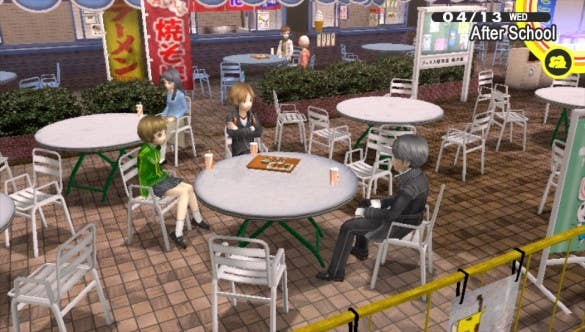
What makes Persona 4 truly special, though, is how much it improves upon the already refined formula of its predecessor. Atlus trimmed the fat on an already lean experience by cutting down on all of the needless traveling from Point A to Point B: Areas are now much more compact, and a single-button shortcut can zap you to a chosen destination—sure beats the long, daily trudge up to your dorm room in Persona 3. And Persona 4 makes another change for the better by going for a more rural setting than the trendy city found in the previous game. Both backdrops might be foreign to American players, but the sleepy town of Inaba definitely presents a more unique and charming atmosphere that's easy to lose yourself in.
With all the previously mentioned qualities, Persona 4 would be a great RPG—but it's the story and characters that push it past "great" and into "phenomenal." Rather than concentrating on world-building and long, boring speeches full of needless and confusing neologisms, Persona 4 plays out like a modern, serialized murder mystery. Just as each day gives you plenty to do, every 24 hours yields the chance to watch just a little more of Persona 4's plot unfold. And, even if the murders have a certain supernatural quality to them, the characters and their actions remain grounded in the reality of situation—with high schoolers and other citizens of Inaba being snuffed out around them, the stakes are incredibly high from the start.
It's been a long, hard near-decade without another Persona game, but in that time, love for the rebooted form of Atlus' series continues to thrive. Even after spending hundreds of hours with these characters, fans still don't want to see them go, and Atlus has been taking advantage of this lucrative situation with enhanced portable remakes, fighting games, and even an upcoming rhythm game. No one could have predicted such a late PlayStation 2 release could have such longevity, and, with any luck, Persona 5 will have the same appeal. Just don't expect the cast of Persona 4 to go away anytime soon.
Kat Bailey, Senior Editor
There's no doubt in my mind that Persona 4 is one of the best RPGs of the past 15 years. It can certainly claim to be the best JRPG, though it sadly hasn't had enough competition in that regard. It took everything that was great about Persona 3 and pushed it one step further with its outstanding cast, well-defined setting, and outright weirdness. Moreover, it drew you in and made you feel like part of the group. I actually got a little choked up in the final moments as I waved goodbye to the characters that I had grown to love over the course of 70 some hours - an extreme rarity in any game for me.
Bob has done a good job of outlining the qualities that makes Persona 4 stand out, but we'd be remiss if we didn't mention Persona 4 Golden - the port that arguably pushed Persona 4 over the top. Before P4 Golden, a lot of Persona 3 fans that I knew tended to disdain it simply for being different, and for being... well... really yellow. The Vita port was akin to the moment when the Persona 4 cast tried on their glasses and saw the TV World clearly for the first time. For new fans, it was a chance to play an RPG that had gotten a little lost in the dying embers of the PlayStation 2.
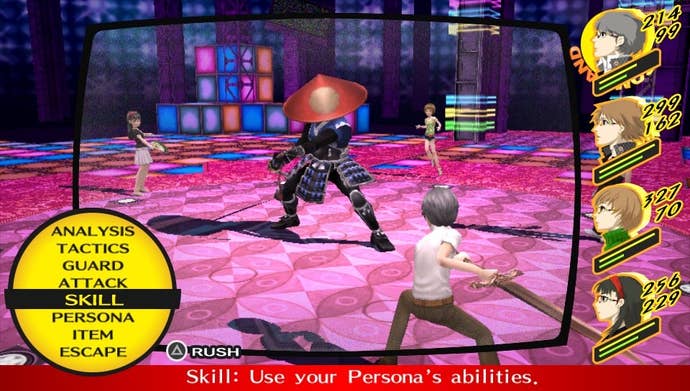
On top of luring in newcomers, Persona 4 Golden brought a great deal to the table for returning fans. Its clever "thought bubble" system relieved some of the anxiety over what to do next by crowdsourcing what everyone else's move had been, and it added in a pair of intriguing social links. For good measure, Atlus added in a couple more months of game time that served to round off the story in a satisfying way. It is the definitive version of Persona 4, and it is still regarded by many as the Vita's best game.
I personally have a tremendous amount of respect for what Atlus has accomplished with Persona 4. It hits what I might consider the holy trinity for RPGs - it tells a great story, offers compelling mechanics, and gives you free rein over a deep and nuanced setting. It's rare to find an RPG that hits two of those elements, let alone all three. Even well-regarded games like Fallout 3 don't really manage it. But in Persona 4, I'm just as likely to find myself completely engrossed in the complexities of Demon Fusion as I am in a random social link. We haven't even gotten to the marvelous way in which Atlus fuses the social links that form the story's emotional core with the mechanics of Demon Fusion, unlocking new and more powerful demons as you steadily build up your presence in Inaba.
There's so much to this game that I could probably write another thousands word on it. But instead I'm just going to encourage you to pick it up yourself if you haven't already given it a shot. And hurry, because Persona 5 is just around the corner. It's going to have a lot to live up to.




